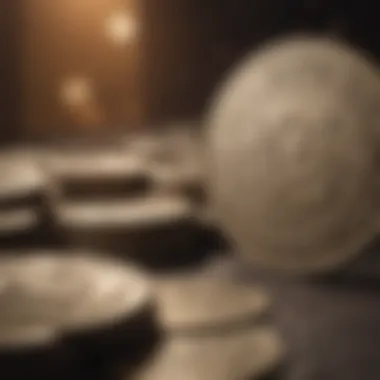Selling Iraqi Dinar: An In-Depth Guide


Intro
Selling Iraqi Dinar, though not as mainstream as dealing with currencies like the dollar or euro, presents unique opportunities and challenges. Understanding the economic landscape surrounding this currency is crucial for anyone looking to engage in its sale. This article aims to shed light on the intricate dynamics involved in selling Iraqi Dinar, exploring everything from market trends to practical considerations that prospective sellers should keep in mind.
In a world where currency values fluctuate daily due to various factors—political stability, oil prices, and international relations—having a grasp of the specific jargon and financial concepts related to such transactions can be immensely helpful. This isn’t merely about exchanging money; it’s about navigating an economic maze where informed decisions can make all the difference.
This guide dives deep, breaking down essential investment terms that any seller should know. Furthermore, it will provide a detailed glossary of financial terms, ensuring that even those who are not well-versed in finance can feel confident as they navigate the sale of Iraqi Dinar.
As the saying goes, "When in Rome, do as the Romans do." Familiarizing oneself with the local market nuances and terminologies can empower sellers to maximize their selling experience, whether they are beginners seeking advice or seasoned investors looking to capitalize on their assets.
Understanding Iraqi Dinar
The Iraqi Dinar, often referred to in conversations about investments and currency trading, carries not just the weight of its face value but also the echoes of a tumultuous history and the complexities of current economic realities. Understanding the Dinar is crucial for anyone looking to sell it, as it serves as a prism through which market dynamics, value assessment, and even legal ramifications can be comprehended.
The importance of grasping the intricacies of this currency cannot be overstated. For investors and enthusiasts alike, a firm understanding provides a bedrock for making informed decisions. With many variables at play—from historical context to present market conditions—one cannot simply leap into transactions without a solid grounding.
Historical Context
The saga of the Iraqi Dinar begins well before its current iteration. The currency was originally introduced in 1932, replacing the Indian Rupee. Over the decades, it has undergone various changes, particularly post-1990 when Iraq faced international isolation due to conflicts and subsequent sanctions. This isolation had a profound impact on the Dinar's value, leading to significant fluctuations.
By 2003, following the invasion of Iraq, the Dinar looked drastically different. The introduction of a new series of banknotes aimed to restore the currency’s stature and inspire confidence among the populace. Understanding this historical backdrop is not just academic; it sheds light on the timeliness of current investment scenarios. Past events influence investor perception today, creating a landscape where sentiment can often outweigh fundamental value.
Current Market Status
Fast forward to the present day, the Iraqi Dinar finds itself in a market that is fraught with speculation and volatility. Despite efforts by the Iraqi government to stabilize and improve the economy, various factors including global oil prices, political stability, and international relations contribute to its ups and downs.
Currently, the Dinar is often traded on both formal and informal markets. This duality presents opportunities but also risks for sellers looking to navigate the intricate pathways of currency exchange.
Below are some insights regarding the current status that buyers and sellers should note:
- Market Sentiment: Echos of optimism and pessimism in the market can swing prices significantly.
- Exchange Rates: Fluctuations against major currencies like the USD need to be monitored rigorously; they determine the attractiveness of selling the Dinar.
- Demand and Supply: The economic climate both domestically and internationally can affect how liquid the Dinar is at any given moment.
In summary, grasping these concepts about the Iraqi Dinar—the historical fabric interwoven with its current market positioning—is imperative for anyone interested in its sale. Understanding lays the groundwork for thoughtful strategies and better decision-making, whether you are a novice or a seasoned investor.
Determining Value
Understanding the value of Iraqi Dinar is crucial for anyone looking to navigate the selling process effectively. Knowing your currency's worth can prevent financial pitfalls and aid in making informed decisions. The valuation isn't just about numbers; it’s influenced by a mix of factors that can change the game in an instant. A clear grasp of these considerations can significantly enhance your overall selling experience.
Factors Influencing Value
Several elements play a significant role in determining the value of Iraqi Dinar, and it’s essential to be aware of them:
- Supply and Demand: Like any currency, the basics of supply and demand affect the Dinar's value. If demand surges but supply remains stable, prices tend to rise.
- Economic Stability: The overall economic conditions in Iraq, such as inflation rates, employment levels, and foreign investments, can sway the Dinar's value. If the economy shows promise, the currency typically appreciates.
- Global Market Trends: Shifts in the international market can influence local currency values. For instance, events such as political upheaval or significant policy changes in Iraq can cause fluctuations.
- Exchange Rates: Keep an eye on the exchange rates compared to major currencies like USD or EUR. The fluctuations here can have a direct impact on how much you can get for your Dinar.
It's worth noting that these factors are interrelated. A rise in demand might seem beneficial, but if economic stability takes a hit simultaneously, it can lead to a volatile situation.
Assessing Your Currency
Before selling, it’s vital to assess the condition and authenticity of your Iraqi Dinar. This process goes beyond simply looking at the bill's face value:
- Condition of Your Notes: The physical state of your Dinar affects its worth. Well-preserved, crisp notes are likely to fetch a better price than worn or damaged ones. Take care to store your Dinar properly—avoid folding or creasing.
- Authentication: Ensure your currency is genuine. Counterfeit notes can be a big issue in the market, so consider getting a professional appraisal if you’re unsure. Using trusted resources or platforms to verify authenticity can save you from future headaches.
- Denominations: Knowing the specific denominations you hold can help evaluate your potential return. Higher denominations may carry a different demand in the marketplace.


By carefully assessing both the condition and authenticity of your currency, you can position yourself to make the most informed decision when you decide to sell.
"The right information today can save you from losses tomorrow."
In summary, determining the value of your Iraqi Dinar is fundamental for anyone considering its sale. Awareness of economic and market variables, along with careful assessment of your currency, provides a robust foundation for navigating this complex financial landscape.
Possible Venues for Selling
When it comes to selling Iraqi Dinar, choosing the right venue can make all the difference in your selling experience. Each option carries its own benefits and critical considerations, making it essential to understand the landscape of potential buyers and platforms. Whether you’re looking for a fast sale or seeking the best possible price, knowing your options can help you make informed decisions.
Banks and Financial Institutions
Banks and financial institutions often provide a reliable option when considering where to sell your Iraqi Dinar. They usually have established systems for currency exchange, offering a secure setting for transactions. However, not all banks deal with multi-currency exchanges, so it’s wise to check ahead of time.
Reasons to Consider Banks:
- Trustworthiness: Banks have solid reputations and regulations overseeing their operations.
- Instant Transactions: Transactions at banks can be swift, allowing you to access your funds quickly.
- Expertise: Financial institutions may assist in evaluating your currency and providing fair value.
Still, be mindful that banks may charge a commission or lower rates than other avenues, so read the fine print.
Currency Exchange Services
Currency exchange services stand out as a popular choice for selling Iraqi Dinar. These specialized companies exist solely for currency trading, which often means they can provide competitive rates. They vary widely in their offerings, with some local services and others that operate internationally.
Why Opt for Currency Exchange Services?
- Greater Variety: They often accept multiple currencies, offering more flexibility.
- Competitive Rates: Can sometimes provide better exchange rates compared to banks.
- Specialized Knowledge: Their focus on currency can lead to higher expertise in valuation.
Nevertheless, it's essential to compare several services, as rates and fees can shift rapidly based on market conditions.
Online Marketplaces
The digital age has opened the floodgates for various online marketplaces, providing opportunities for sellers to reach a wider audience. Platforms such as eBay, where currency is bought and sold regularly, might yield favorable prices, especially in a competitive bidding environment.
Benefits of Online Marketplaces:
- Wide Reach: Access buyers from diverse geographical locations.
- Flexibility: Sellers can set their prices and sell whenever they like.
- Lower Overheads: Many online platforms have lower operational costs than traditional venues.
However, sellers should proceed cautiously to avoid scams and ensure secure transactions.
"Online platforms can be goldmines for savvy sellers, but roads can be rocky—don’t forget to tread carefully.”
Private Individuals and Collectors
Selling to private individuals or collectors is an option that should not go unnoticed. This avenue naturally allows for personal interactions, which can sometimes lead to better negotiation outcomes. Colleagues, friends, or collectors with an interest in currency can be particularly fruitful markets.
Why Consider Private Sales?
- Potential for Higher Value: Personal negotiations may yield better prices since you aren’t bound by institutional regulations or fees.
- Direct Communication: Discuss terms face-to-face can help build trust and ease the selling process.
- Niche Market: Collectors may value rare or unique denominations, leading to a potentially more lucrative sale.
On the flip side, ensure to validate the legitimacy of buyers to avoid being caught in fraudulent situations.
Legal Considerations


When it comes to selling Iraqi Dinar, understanding the legal considerations is crucial. This aspect not only involves knowing the relevant regulations in your country but also understanding any implications that may arise regarding taxes and compliance. Ignoring these factors could lead to unexpected complications, which may create hurdles in what should be a straightforward transaction. By grasping the legal landscape surrounding currency sales, you ensure that your efforts are both efficient and compliant.
Regulations in Your Country
Every country has its own set of regulations governing currency exchange. It’s paramount to familiarize yourself with these laws before embarking on the sale of your Iraqi Dinar. In some regions, selling foreign currency is as common as buying a cup of coffee, while in others, it might raise eyebrows.
Some key points to consider include:
- Licensing Requirements: Certain regions necessitate that currency dealers carry a special license or permit. This could be the make or break for selling currencies legally.
- Reporting Requirements: In places like the United States, transactions over a specified amount may need to be reported to financial authorities. Ignorance of such rules could land you in hot water.
- Legal Tender Status: Depending on where you live, Iraqi Dinar might not be recognized as a legal currency. This affects the ease with which you can sell it.
It’s wise to check with local financial institutions or regulators to map out the dos and don’ts regarding your currency dealings. The rules can vary significantly; you don’t want to be caught off guard.
Tax Implications
Tax implications are another element that warrants your attention. Selling Iraqi Dinar, like any capital asset, can sometimes trigger tax liabilities. How much you owe and whether you're liable at all depends on various factors, but here are some general aspects to keep in mind:
- Capital Gains Tax: If you sell your Dinar for more than what you initially paid, you may be liable for capital gains tax on the profit. It's essential to keep accurate records of your purchases and sales.
- Reporting Income: Any money made through the sale is typically considered income, thus must be reported in your tax return. You don’t want to expose yourself to audits or penalties for failing to disclose earnings.
- Deductions: Depending on local tax laws, you may be able to deduct certain costs associated with the purchase or sale of the currency. Check if this applies to you.
Always consult a tax professional familiar with currency transactions in your specific country. They can give insights tailored to your situation.
Selling Process
The selling process of the Iraqi Dinar, like any currency transaction, requires careful navigation. It’s not merely about handing over cash for a price; it involves understanding the intricate dynamics of value, market trends, and buyer expectations. By investing time and effort into this process, sellers can optimize their returns and minimize stress while dealing with potential pitfalls.
Preparing Your Dinar for Sale
Before venturing into the world of currency selling, sellers must first prepare their Dinar. This step is crucial and has several components:
- Assessing Condition: The physical condition of your Dinar plays a pivotal role in determining its desirability and ultimate value. Check for any tears, stains, or unusual markings. Well-preserved notes typically fetch a higher price.
- Researching Denominations: Not all denominations hold the same value in the market. Commonly traded notes may need to be distinguished from rarer ones that could attract collectors. Spend some time online to gather information about which denominations are in demand.
- Organizing Documentation: Having substantial documentation that authenticates your currency can build trust with potential buyers. This could include receipts from purchases, historical information about the currency, or even investment records if it’s a larger transaction.
Making sure your Dinar is presentable and well-documented can boost your confidence as you engage potential buyers.
Negotiating Offers
Once the necessary groundwork has been laid, sellers must enter into negotiations with potential buyers. This stage not only tests your negotiating skills but requires a keen sense of timing and market perception:
- Setting a Realistic Price: One of the more delicate aspects of negotiation is determining a fair selling price. Sellers should take recent market trends into account while being aware of emotional pricing. If you overestimate your Dinar's worth, you may scare off potential buyers. However, underselling can lead to regret later.
- Being Open to Offers: When potential buyers present offers, it's important not to dismiss them outright. Maintain an open mind during discussions; after all, an offer is merely a starting point. Engaging in constructive dialogue may lead to better offers than anticipated.
- Knowing When to Walk Away: Just as significant as accepting an offer is the ability to walk away from a bad deal. If you feel the negotiations aren’t meeting your expectations, be prepared to decline politely. It’s better to keep your currency for a while rather than accept a price that doesn't feel right.
These components of negotiation ensure that sellers aren’t just left settling but find a true reflection of their currency's value.
Completing the Transaction
After fruitful negotiations, the final phase involves completing the transaction. This step is where clear communication and thoroughness come into play:
- Choosing Payment Methods: It's wise to decide on a secure and practical payment method. Whether through bank transfers, online payment platforms, or cash, ensure both parties are comfortable with the approach taken. Avoid unusual methods that might raise eyebrows.
- Documenting the Sale: It’s essential to keep records of the transaction. A simple bill of sale, including the date, parties involved, currency details, and price, can safeguard both parties. This documentation provides proof in case issues arise later.
- Final Checks: Before closing the deal, double-check all monetary exchanges to avoid discrepancies. Trust your instincts; if something feels off, it may be worth investigating further.
Completing the transaction should feel rewarding, not stressful. Taking detailed steps ensures security for both buyer and seller.
"By preparing thoroughly, negotiating wisely, and completing transactions carefully, sellers can transform the potentially overwhelming process of selling Iraqi Dinar into a manageable and profitable venture."
Understanding these elements of the selling process is crucial and can lead to successful outcomes in the often turbulent waters of currency trading.
Risks Involved


When dealing with currency transactions, understanding the risks involved is paramount. Selling Iraqi Dinar is no exception. This section dives into the specific elements that can impact your selling journey. Recognizing these risks can help you make informed decisions and avoid potential pitfalls.
Market Volatility
Market volatility can act as a double-edged sword for those looking to sell their Iraqi Dinar. Prices may fluctuate based on various factors such as geopolitical events, changes in oil prices, and even shifts in market sentiment. For instance, if a significant political event occurs in Iraq, it could lead to sharp movements in the Dinar's value. This means that a selling decision made today might not yield the same results tomorrow.
To mitigate this risk, keep a close watch on current events and economic indicators. Consider employing the following strategies:
- Stay Informed: Regularly check financial news, economics reports, and currency trading forums.
- Be Patient: Sometimes holding onto your currency for a short period may lead to a more favorable selling price.
- Set Limits: If you’re using an exchange or selling platform, setting a limit order can protect you from sudden market drops.
"Understanding the timing of your sale could be the difference between profit and loss."
Potential for Fraud
The risk of fraud is a major concern in the world of currency sales, particularly with a currency like the Iraqi Dinar. The allure of potential profits can attract less-than-reputable buyers or platforms. Scams can take many forms—from fake online exchanges to individuals posing as legitimate buyers.
To avoid falling prey to such frauds, consider these precautions:
- Verify Platforms: Use reputable exchange services and read reviews. Websites like Reddit can provide insight from other users' experiences.
- Don’t Rush: Scammers often create a sense of urgency. Take your time to assess the buyer and platform.
- Educate Yourself: Familiarize yourself with common fraudulent tactics to better recognize them.
By being aware of these risks—market related fluctuations and the potential for fraud—you empower yourself to navigate the selling process more effectively. It's always better to be cautious than to leap headlong into a situation without understanding the landscape.
Alternatives to Selling
When considering the sale of Iraqi Dinar, it’s critical to evaluate the alternatives available. Not every individual may find that selling is the best pathway, especially when other options might yield greater long-term benefits. This section delves into the nuances of holding onto your dinars for future appreciation and the potential of exchanging them for other currencies. Both alternatives come with their own sets of factors, requirments and considerations, which can significantly affect the overall health of your investments.
Holding for Future Appreciation
Holding onto Iraqi Dinar can be a strategy worth considering, especially for those who believe in the currency's potential rebirth. Here are some important aspects to weigh:
- Market Predictions: Currency markets are as unpredictable as the weather. Even seasoned analysts can miss the mark, but many foresee possible gains as the Iraqi economy stabilizes. If you think about it, investing in dinars might just be akin to planting seeds while waiting for the right season to see them blossom.
- Investment Horizon: Patience is often a virtue in investing. If someone is eyeing long-term gains and can withstand fluctuations, holding could be a wise decision. Short-term traders, on the other hand, might find themselves on a roller-coaster ride, often left feeling dizzy from the ups and downs.
- Inflation Considerations: Protecting against inflation is key. If the value of the dinar appreciates, it’s possible it will outpace inflation, thereby increasing real purchasing power in the future. However, inflation can be a double-edged sword as it could also erode purchasing power if not monitored closely.
In essence, holding on to your dinar is like keeping your cards close to your chest, where timing plays a crucial role. You may just hit the jackpot if conditions favor an upward shift in value.
Exchanging for Other Currencies
If straightforward selling does not faze you, then consider exchanging Iraqi Dinar for more stable currencies. Here are some points to think about:
- Diverse Currency Gains: By converting dinars into a major currency like the US dollar or the Euro, you can mitigate risks associated with holding a single currency. This can yield immediate gains, especially if market values have shifted positively.
- Travel and Trade Benefits: If you’re planning to travel, or maybe even conduct trade, having other currencies on hand can ease transactions, making you less reliant on transfers. Picture yourself at a foreign market, able to negotiate like a local.
- Avoiding the Waiting Game: Exchanging allows you to sidestep the waiting game often associated with holding currency for appreciation. You might access funds to invest in other ventures or meet life’s demands instead.
In short, deciding to exchange for other currencies is like giving yourself a safety net. While Iraqi Dinar may fluctuate, having a stable currency can provide you peace of mind and more spending flexibility.
"When the tide comes in, not everyone needs to board the boat. Some may prefer building a dock."
These alternatives can enhance the overall strategy that best aligns with individual financial goals and market outlooks.
Finale
In wrapping up our discussion, it becomes clear that selling Iraqi Dinar is not simply a transaction; it’s a calculated endeavor, steeped in understanding the currency's complex nature, market behaviors, and potential opportunities. Every aspect covered in this guide, from the historical context to the various selling venues, underscores the multifaceted approach needed in this arena.
The knowledge gained throughout this article serves as a crucial backbone for both novices and seasoned investors. It incentivizes informed decisions, ensuring that sellers can navigate the murky waters of currency trading with confidence. The first step is always the most daunting; however, knowing how to determine value and assess market conditions makes it feel less like venturing into deep waters without a life raft.
One cannot overlook the importance of legal considerations. After all, understanding regulations in one’s country and potential tax implications ensures one doesn’t trip on legal technicalities that could sour what should be a straightforward process.
Furthermore, the discussion surrounding alternatives to outright selling illustrates a broader range of choices available. Holding for future appreciation or exchanging for currencies with more stability can open the doors to different financial strategies that may better suit individual goals.
It’s essential to remember: The landscape of currency trading is ever-changing, with trends that shift like sand underfoot. Staying informed and adaptable can make all the difference.
In summary, this guide doesn’t just share facts about selling Iraqi Dinar; it equips you with the tools needed to make strategic decisions. As you move forward, carry this knowledge like an umbrella on a cloudy day. You never know when it might rain uncertainties, and being prepared will always keep you one step ahead.















